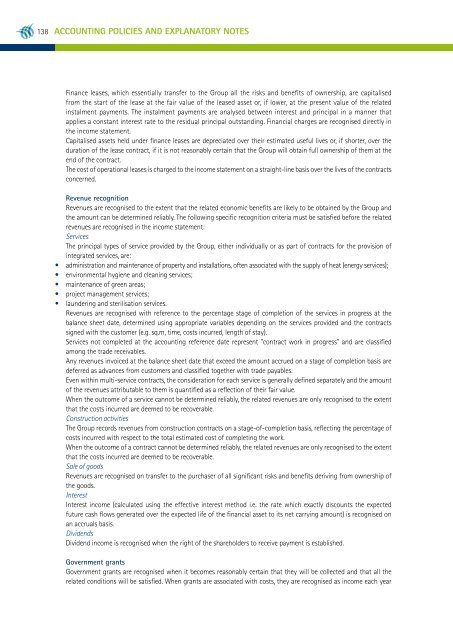Save PDF - Manutencoop
Save PDF - Manutencoop
Save PDF - Manutencoop
You also want an ePaper? Increase the reach of your titles
YUMPU automatically turns print PDFs into web optimized ePapers that Google loves.
138 Accounting policies and explanatory notes<br />
Finance leases, which essentially transfer to the Group all the risks and benefits of ownership, are capitalised<br />
from the start of the lease at the fair value of the leased asset or, if lower, at the present value of the related<br />
instalment payments. The instalment payments are analysed between interest and principal in a manner that<br />
applies a constant interest rate to the residual principal outstanding. Financial charges are recognised directly in<br />
the income statement.<br />
Capitalised assets held under finance leases are depreciated over their estimated useful lives or, if shorter, over the<br />
duration of the lease contract, if it is not reasonably certain that the Group will obtain full ownership of them at the<br />
end of the contract.<br />
The cost of operational leases is charged to the income statement on a straight-line basis over the lives of the contracts<br />
concerned.<br />
Revenue recognition<br />
Revenues are recognised to the extent that the related economic benefits are likely to be obtained by the Group and<br />
the amount can be determined reliably. The following specific recognition criteria must be satisfied before the related<br />
revenues are recognised in the income statement:<br />
Services<br />
The principal types of service provided by the Group, either individually or as part of contracts for the provision of<br />
integrated services, are:<br />
• administration and maintenance of property and installations, often associated with the supply of heat (energy services);<br />
• environmental hygiene and cleaning services;<br />
• maintenance of green areas;<br />
• project management services;<br />
• laundering and sterilisation services.<br />
Revenues are recognised with reference to the percentage stage of completion of the services in progress at the<br />
balance sheet date, determined using appropriate variables depending on the services provided and the contracts<br />
signed with the customer (e.g. sq.m, time, costs incurred, length of stay).<br />
Services not completed at the accounting reference date represent "contract work in progress" and are classified<br />
among the trade receivables.<br />
Any revenues invoiced at the balance sheet date that exceed the amount accrued on a stage of completion basis are<br />
deferred as advances from customers and classified together with trade payables.<br />
Even within multi-service contracts, the consideration for each service is generally defined separately and the amount<br />
of the revenues attributable to them is quantified as a reflection of their fair value.<br />
When the outcome of a service cannot be determined reliably, the related revenues are only recognised to the extent<br />
that the costs incurred are deemed to be recoverable.<br />
Construction activities<br />
The Group records revenues from construction contracts on a stage-of-completion basis, reflecting the percentage of<br />
costs incurred with respect to the total estimated cost of completing the work.<br />
When the outcome of a contract cannot be determined reliably, the related revenues are only recognised to the extent<br />
that the costs incurred are deemed to be recoverable.<br />
Sale of goods<br />
Revenues are recognised on transfer to the purchaser of all significant risks and benefits deriving from ownership of<br />
the goods.<br />
Interest<br />
Interest income (calculated using the effective interest method i.e. the rate which exactly discounts the expected<br />
future cash flows generated over the expected life of the financial asset to its net carrying amount) is recognised on<br />
an accruals basis.<br />
Dividends<br />
Dividend income is recognised when the right of the shareholders to receive payment is established.<br />
Government grants<br />
Government grants are recognised when it becomes reasonably certain that they will be collected and that all the<br />
related conditions will be satisfied. When grants are associated with costs, they are recognised as income each year








